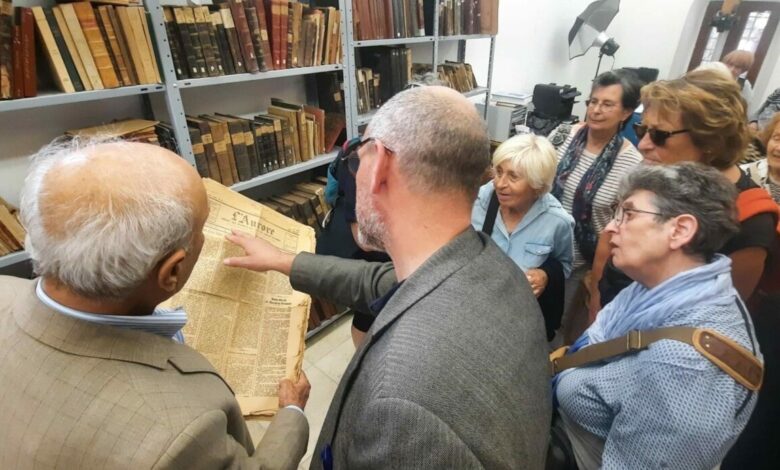Three Palestinian libraries in East Jerusalem are involved in a project to index and restore manuscripts dating back hundreds of years, some to the 12th century.
The project involves the Khalidi Library, the Budeiri Family Library, and the Issaf Nashashibi Center for Culture and Literature.
Funded by the Aliph Foundation (International Alliance for the Protection of Heritage in Conflict Areas), the project aims to preserve the manuscripts at a controlled temperature and humidity to preserve them from damage, while cataloguing them electronically for presentation on the Internet.
Khader Salameh, director of the Khalidi Library, told Al-Fanar Media that the manuscripts are part of the heritage and history of the Palestinian people. They tell the culture and customs of a wide range of people and reflect their lifestyles and ways of thinking, he said.
Biographies of Jerusalem Families
The bulk of the manuscripts and documents represent the biographies of families living in Jerusalem between 1896 and 1930 from newspapers, magazines and handwritten documents.
Salameh said the project aimed to link civil, personal, and family libraries in Jerusalem with each other to help researchers find manuscripts and archival documents. The three libraries embody “the collective history of the people of the city of Jerusalem,” he said.
The Khalidi Library was founded in 1900 and is the first Arab public library established by private initiative in Palestine. It is located in the Old City of Jerusalem and has resisted attempts to seize the property since 1967, thanks to the efforts of the Khalidi family in Jerusalem and abroad.
The bulk of the manuscripts and documents represent the biographies of families living in Jerusalem between 1896 and 1930 from newspapers, magazines and handwritten documents.
The preservation team is currently working on indexing these documents. They include papers describing the first prayers arranged for women inside the Dome of the Rock at Al-Aqsa Mosque in 1952, and older documents—including one about the tombs of three warrior princes who participated in the liberation of Jerusalem from the Crusaders during the 12th and 13th centuries.
Lack of Appropriate Conditions
Doaa Qirsh, director of projects at the Issaf Nashahshibi Center, told Al-Fanar Media that the project’s documents and 500 manuscripts often relate to Jerusalem families, and particularly involve Islamic law and Arabic literature.
In Palestine and Jerusalem in particular, she said, there are thousands of ancient manuscripts in the collections of Islamic endowments or family libraries.
Qirsh, who is also the center’s librarian, said most of these manuscripts suffer from wear and tear and lack appropriate conditions for preservation.
“This has necessitated the establishment of several laboratories for restoration, the most important of which are the Manuscripts Restoration Center of the Islamic Endowments Department inside the Haram al-Sharif (Temple Mount), another in Abu Dis, in East Jerusalem, and a new laboratory in the Khalidi Library.”
According to Qirsh, coordination between the libraries will help them provide a cultural service to the Jerusalem public and researchers.
The Issaf Nashashibi Center’s library is the only Palestinian public library in East Jerusalem regularly open to the public, she said. Other libraries in the city are not permanently open because of lack of resources.
The Restoration Process
Rami Salameh, who is in charge of restoring the manuscripts, said they first had to be documented and examined to see if they needed restoration.
If they require restoration, the first stage is mechanical cleaning using soft brushes and special sponges. Some manuscripts also need washing with a solution of alcohol and water, carefully mixed so that the ink used in the manuscript does not dissolve. The final step is binding.
“We cannot restore all manuscripts because it takes time and financial support,” Rami Salameh said. “Therefore, we chose only 20 manuscripts to restore because of their relationship to the Holy City and the number of their papers.”
Salameh is carrying out this work in the Manuscript Restoration Laboratory at the Khalidi Library. The limited budget means he cannot always employ additional professional restoration staff.
“There are thousands of manuscripts that need restoration to preserve them from extinction,” he said.
Documents in the Khalidi Library’s Collection
Shaima Al-Budairi, digital librarian at the Khalidi Library, told Al-Fanar Media that the paper in some manuscripts had degraded through being stored in damp places. Indexing and restoring them will protect them from further damage, she said.
‘Exceptional Importance’
Mufid Jalgoum, a professor of history at Al-Quds Open University, said the project was of “exceptional importance” because of the thousands of manuscripts the city holds.
Dozens of Jerusalem manuscripts were moved abroad after the Ottomans surrendered the city to Britain in 1917, Jalgoum said, and many more were taken after the Palestinian Nakba in 1948. “Zionist groups stole, at that time, what the Palestinian families had of books and libraries,” he said.
“Preserving the remaining manuscripts requires a restoration strategy and financial support from cultural institutions, so that this heritage becomes available to researchers and scholars,” Jalgoum said. Libraries should assist in the restoration and preservation, and the work must be done to international standards, he added.
Cultural institutions should attach particular importance to the establishment of a museum of Palestinian manuscripts in Jerusalem, Jalgoum said.
Such a facility, he said, would protect against what he considered to be “an attempt to get rid of the written narrative as archaeological, historical, geographical and social evidence about the history of the Holy City.”
Related Reading
- The Artist Jumana Manna Preserves Palestinian Heritage Through Film, Music, and Seeds
- Palestinian Brothers Once Jailed in the Intifada Work to Restore Nablus
- Photo Exhibition Backs Palestinian Refugee Camp’s Quest for UNESCO Status
- Palestinian Art Proclaims a People’s Identity in the Conflict with Israel
source/content: al-fanarmedia.org (headline edited)
_______________

______________
PALESTINE